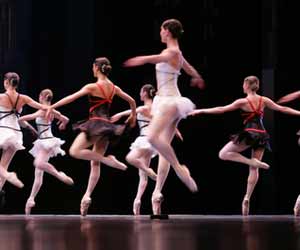Ballet Dancer Careers
Interview
What is your job title?
I am a professional ballet dancer.
What kind of education and/or special training is needed? Does it help to attend a university and earn a dance degree?
I began training when I was five and took ballet classes at a local church. A year or so later, I found a different local teacher who became my mentor, and I studied seriously with her until I was fourteen. During the time I studied with her, I had my first paid performing experience at a local theater. I went on pointe (dancing in pointe shoes) when I was twelve, and shortly thereafter, my teacher suggested that I try out for the summer study program at the School of American Ballet in New York. After a nerve-wracking audition, I was accepted there, and went on to become a full-time student for six years. I also studied at the San Francisco Ballet School for two additional years, and began performing regularly with that company and my professional career was born. So all totaled, I trained for fourteen years.
Most professional ballet dancers begin dance training when they are quite young, usually from about five to eight years old. I know of one dancer who began when she was twelve but that is very rare. Ballerinas train by going to ballet lessons. They start in a local dance studio, but once they become teenagers and decide to pursue a career, that means they need to train at a professional ballet school, usually in a big city. Many ballet companies have their own schools where future generations of professional dancers are trained.
What is the job outlook for the dance industry and dance jobs?
Ballet companies are hiring all the time. Of course, a lot depends on your level of talent. If you are an amazingly strong dancer with a perfect body, then chances are that you could get hired just about anywhere. A lot of dancers I know have looked for opportunities in other countries, and some have even joined with modern dance companies or other types of companies. Some people I danced with in New York have found work in theater and opera, while others had a career for a while and then got teaching jobs.
What is your favorite aspect of your dance job?
One of the best things about my job is that I often get paid to travel. My company tours a lot. We’ve toured in Israel, Ecuador, Quebec, New York City, and all over the United States. The company takes really good care of us, everything is paid for and we often get to stay in really nice hotels.
What is your least favorite aspect of your position?
The hardest part of my job is that my free time is extremely limited. We have a six-day workweek, with Mondays being our only day off. That makes it hard to pursue other hobbies and spend time with friends and family. I often find myself spending my day off doing laundry and resting.
What advice would you give someone who wishes to become a professional ballet dancer?
First of all, I would advise them to become the best dancers they can possibly be. Try to find ways to grow as a dancer.
For instance, I found it very helpful to supplement my ballet classes with Pilates classes and yoga classes to increase my strength and body awareness. I took private dance lessons for a year to get one-on-one instruction with some of the moves that were challenging for me.
I think it’s also important to do whatever you can to stay positive and focused. Create a support network of family, friends and teachers. Think your way to success by believing in yourself.
Finally, keep your eyes open for opportunity. You may not get hired at the company that is your first choice, but there are opportunities available in lots of other places. Consider looking into alternative styles of dance if you are having difficulty getting hired in ballet companies.
How did you get hired for this job?
I guess I got hired the most common way- by going to an audition. I flew into New York City for the weekend and went to this huge “cattle call” (what dancers call auditions where lots of people show up) that lasted all day. I don’t even know how many hours I had to wait before I was called in to dance, but once I went in, they kept us for a long time. At the end of the day, they had narrowed the choice down to ten dancers out of the original three hundred or so. A week later, they called me and offered me a contract.


 Teach English in Asia
Teach English in Asia  Cruise Ship Jobs
Cruise Ship Jobs  Alaska Fishing Industry Jobs
Alaska Fishing Industry Jobs  Sharing Economy / Gig Economy
Sharing Economy / Gig Economy 